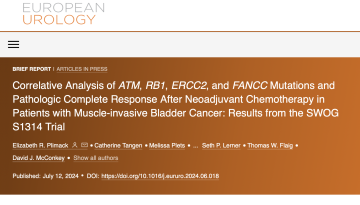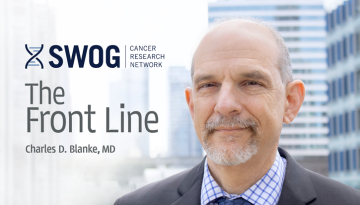Remembering Dr. Worta McCaskill-Stevens
It's with great sadness that I share news of the death this week of Dr. Worta McCaskill-Stevens. The founding director of the National Cancer Institute (NCI) Community Oncology Research Program (NCORP) and a pioneer in bringing cancer care and cancer clinical trials to underserved communities, she was also a friend and colleague to many of us, and she was one of my mentors during my fellowship.
She remained an inspiration for much of my career in the network groups.
In remembering Dr. McCaskill-Stevens, Dr. Dawn Hershman, SWOG vice chair for NCORP and group co-chair-elect, spoke of the lasting value and impact of her contributions :
“Worta was an exceptional role-model, leader, and advocate for the community and those who were under-represented on every level, and she will be deeply missed. However, what she has built and her legacy will continue to change the lives of people at risk for or affected by cancer for decades to come.”
Frank L. Meyskens, Jr., MD, who was SWOG associate chair for cancer control and prevention when the NCORP was being founded, said “Worta was a very effective communicator and a joy to work with. She will be greatly missed.”
Dr. McCaskill-Stevens‘s initial role at the NCI was in breast cancer prevention, as program director for the Study of Tamoxifen and Raloxifene (STAR), but her belief in a cancer research endeavor that served and valued all communities inspired others, as Dana Sparks, SWOG’s director of operations, remembers:
“During the time of the large prevention trials – BCPT, PCPT, STAR, and SELECT – there was a lot of interaction among the lead cooperative groups and participating sites, learning from other study experiences and establishing best practices – including practical emphasis on diversity efforts, and site and participant engagement. Dr. McCaskill-Stevens set the bar and led the way for many of these efforts. It amazes me how modern these activities and the concepts behind them were, despite how much time has passed.”
As chief of the NCI’s Community Oncology and Prevention Trials Research Group during the time when the Institute of Medicine’s 2010 report was driving a major revamp of the NCI’s cancer clinical trials programs, Dr. McCaskill-Stevens’s vision and oversight helped meld the earlier Community Clinical Oncology Program and National Community Cancer Centers Program together into today’s NCORP. The new program’s founding goal was to bring cancer trials and cancer care delivery research to individuals in their own communities, generating a broad evidence base that improves outcomes and reduces cancer disparities. Today, NCORP institutions enroll roughly half of all participants to SWOG’s clinical trials.
At an NCORP annual meeting a few years ago, attendees were polled to submit three words that best described the impact the NCORP was having in their own community. In the final word cloud generated by this poll, the three largest terms (those submitted most often) were “hope,” “access,” and “community.” This seems a fitting testament to the impact of Dr. McCaskill-Stevens’s vision.
I speak for all of SWOG’s leadership in saying that she will be greatly missed and that her memory will continue to inspire us.
Other Recent Stories



